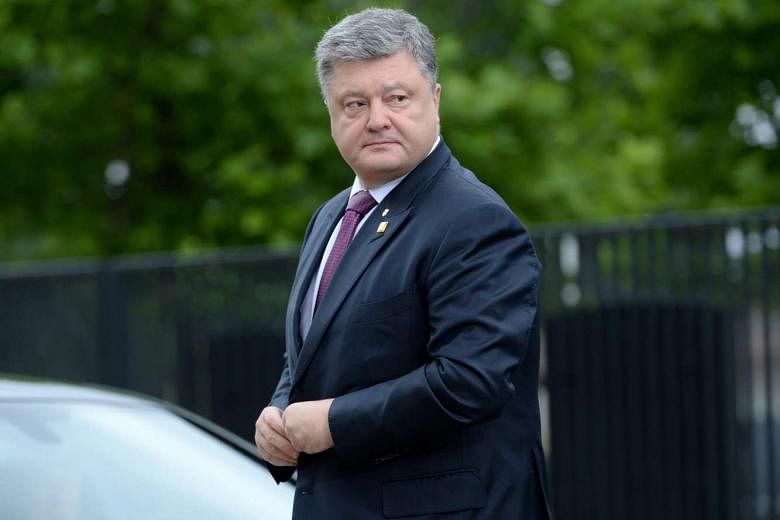WARSAW (AFP) - Nato leaders on Saturday (July 9) kept up the pressure on Russia over Ukraine, stressing the need for unity and a no-nonsense dialogue in dealing with a more aggressive Moscow.
The 28 Nato nations, led by US President Barack Obama at his last alliance summit, on Friday endorsed their biggest military revamp since the end of the Cold War in response to the Ukraine conflict.
The plan includes deploying four battalions of around 1,000 troops each in Poland and the Baltic states to act as a tripwire against any fresh Russian adventurism in its Soviet-era backyard.
"The decisions we took yesterday are of historic importance. I believe that Nato showed very clearly that we stand united, we stand firm," Estonian Prime Minister Taavi Roivas said at the summit in Warsaw.
Leaders will discuss Ukraine with President Petro Poroshenko on Saturday.
Diplomatic sources said that at a dinner late Friday, leaders devoted most of their time to Russia and agreed that only a firm stand would get President Vladimir Putin to mend his ways, especially in Ukraine.
"The unanimous view now is that Nato has to be firm and united. There was unanimous support for Nato's dual approach" of deterrence and dialogue, a Nato official said.
Nato head Jens Stoltenberg announced earlier this week that the alliance would hold fresh talks with Russia on Wednesday as a gesture of the West's openness and good faith.
Lithuanian President Dalia Grybauskaite, a sharp critic of Putin, said a stronger Nato would be better able to talk to Russia.
"I am softening" on the need for dialogue, Grybauskaite told AFP when asked if she was happy to see Nato upping its game.
"We are not closing ourselves (behind) an Iron wall ...it is saying that we are united and strong and because of that we can be open, not afraid and talk with you," she said.
Putin is unlikely to miss the symbolic importance of the summit being held in Warsaw, the birthplace of the Soviet-era Warsaw Pact.
Moscow bitterly opposes Nato's expansion into its Soviet-era satellites, which it sees as a threat to its own security.
Russia is even more critical of the Ballistic Missile Defence system the United States is building to counter missile threats from Iran or the Middle East.
Russia says the missile system will undercut its strategic nuclear deterrent, but Nato leaders nevertheless on Friday declared the system initially operational and handed over control to the US-led alliance.
In addition to Ukraine, Nato leaders also on Saturday discussed Afghanistan, where Taleban rebels are putting the Kabul government under intense pressure.
Obama was forced earlier this week to slow the US pullout, saying 8,400 troops would remain in the war-ravaged country into next year.
The plan had been to draw the force down to 5,500 in 2017 but Obama said a "precarious" security situation had forced a rethink.
Nato allies promised the United States on Saturday they will stump up around US$1 billion (S$1.4 billion) a year over the next three years to help fund the Afghan military, Nato Secretary-General Jens Stoltenberg said on Saturday.
The summit opened Friday under very heavy security overshadowed first by Britain's shock vote to quit the European Union and then the deadly shootings of police officers in Dallas.
The White House said Obama would now cut short a later stop in Spain to be able to visit Dallas next week.
The president said he was sure Britain would continue to play a major security role in both Nato and in Europe, with the summit coming at what he called the most critical time for the alliance since the Cold War.
British Prime Minister David Cameron - who was also at his last Nato summit since resigning after the Brexit vote - insisted Britain was "not turning our back on Nato."

